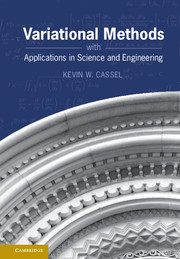5 - Classical Mechanics
from PART II - PHYSICAL APPLICATIONS
Published online by Cambridge University Press: 05 July 2013
Summary
Nature is thrifty in all its actions.
Now, here is this principle, so wise, so worthy of the Supreme Being: when some change occurs in Nature, the amount of Action used for this change is always the smallest possible.
The laws of movement thus deduced [from the principle of least action], being found to be precisely the same as those observed in nature, we can admire the application of it to all phenomena, in the movement of animals, in the vegetation of plants, in the revolution of the heavenly bodies: and the spectacle of the universe becomes so much the grander, so much the more beautiful, so much more worthy of its Author, when one knows that a small number of laws, most wisely established, suffice for all movements.
(Pierre Louis Moreau de Maupertuis)Classical mechanics encompasses those areas of physics that originated prior to the development of relativistic mechanics at the beginning of the twentieth century. Its primary focus is on the application of Newtonian mechanics to macroscopic systems. Classical mechanics provides the basis for many of the important fields in engineering, including solid mechanics, fluid mechanics, transport phenomena, and dynamics. These fields are employed broadly in the design of almost all devices that make modern life possible, including being sure that your mobile phone can withstand a fall on a hard surface, placing and maintaining communication satellites in their orbits, and both terrestrial and extraterrestrial transportation systems.
Information
- Type
- Chapter
- Information
- Variational Methods with Applications in Science and Engineering , pp. 160 - 201Publisher: Cambridge University PressPrint publication year: 2013
